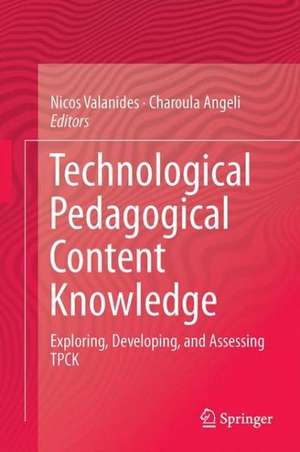Technological Pedagogical Content Knowledge: Exploring, Developing, and Assessing TPCK
Editat de Charoula Angeli, Nicos Valanidesen Limba Engleză Hardback – 14 noi 2014
| Toate formatele și edițiile | Preț | Express |
|---|---|---|
| Paperback (1) | 643.16 lei 6-8 săpt. | |
| Springer Us – 10 sep 2016 | 643.16 lei 6-8 săpt. | |
| Hardback (1) | 649.39 lei 6-8 săpt. | |
| Springer Us – 14 noi 2014 | 649.39 lei 6-8 săpt. |
Preț: 649.39 lei
Preț vechi: 763.99 lei
-15% Nou
Puncte Express: 974
Preț estimativ în valută:
124.28€ • 128.38$ • 103.43£
124.28€ • 128.38$ • 103.43£
Carte tipărită la comandă
Livrare economică 26 martie-09 aprilie
Preluare comenzi: 021 569.72.76
Specificații
ISBN-13: 9781489980793
ISBN-10: 1489980792
Pagini: 300
Ilustrații: XVII, 331 p. 51 illus., 28 illus. in color.
Dimensiuni: 155 x 235 x 25 mm
Greutate: 0.67 kg
Ediția:2015
Editura: Springer Us
Colecția Springer
Locul publicării:New York, NY, United States
ISBN-10: 1489980792
Pagini: 300
Ilustrații: XVII, 331 p. 51 illus., 28 illus. in color.
Dimensiuni: 155 x 235 x 25 mm
Greutate: 0.67 kg
Ediția:2015
Editura: Springer Us
Colecția Springer
Locul publicării:New York, NY, United States
Public țintă
ResearchCuprins
1. Intro.- Part 1: Toretical Perspectives about the Nature of TPCK.- 2. Re-thinking and Re-representing TPCK: Addressing the complexity of teaching with technology.- 3. Mapping TPACK and the Teacher Knowledge Base: Identifying Common Language, Contexts, and Assessments.- 4: Transforming Teachers’ Knowledge for Teaching in the 21st Century: Advancing Teachers’ Education (Margaret L. Niess, Oregon State University, Oregon, USA). - Part II: Research-Based Perspectives about the Nature of TPCK.- 5: The Essential Role of Pedagogical Knowledge in Technology Integration (Cheryl L. Ward, Susan N. Kushner Benson, and Xin Liang, University of Akron, USA).- 6: The TPACK-model revisited (Petra Fisser and Joke Voogt, University of Twente, The Netherlands).- 7: Cognitively Representing TPCK – Mental Models of Tool Functions and Cognitive Integration Processes (Karsten Krauskopf, Carmen Zahn, and, Friedrich W. Hesse).- Part III: The Development of TPCK in Pre-service Teacher Education.- 8: Design and implementation of educational activities with the integration of TDCK: a case study of students at a Department of Early Childhood Education (Aggeliki Tzavara and Vasilis Komis, University of Patras, Greece).- 9: A TPACK-Based Instructional Design Model for Preservice Teacher Education (Chia-Jung Lee (Lily), University of Georgia, Georgia, USA).- 10: Intersection and Impact of Universal Design for Learning (UDL) and Technological, Pedagogical, Content Knowledge (TPACK) on 21st Century Teacher Preparation: UDL Infused TPACK Practitioner’s Model (Hope Benton-Borghi, Ohio Dominican University, OH, USA).- 11: Investigating Teaching and Learning Perceptions of Teachers in a Self-Regulated Learning Program for Attaining TPCK (Bracha Kramarski and Tova Michalsky, Bar Ilan University, Israel).- 12: Designing Effective Technology Preparation Opportunities for Preservice Teachers (Chrystalla Mouza andRachel Karchmer Klein, University of Delaware, Delaware, USA).- 13: TPACKtivity: An Activity Theory Framework for Examining TPACK Development (Marj Terpstra, Calvin College Education Department, MI, USA).- Part IV: The Development of TPCK in Teacher Professional Development Contexts.- 14: Content-Specific Instructional Technology Support: Processes and Perceptions (Sara Dexter, University of Virginia, USA).- 15: A Framework for TPACK-in-Practice: Designing Technology Professional Learning Contexts to Develop Teacher Technology Knowledge (TPACK) (Candace Figg and Kamini Jaipal, Department of Teacher Education, Brock University, Ontario, Canada).- 16: Between the Notion and the Act: Veteran Teachers' TPACK in 1:1 Educational Settings (Lisa Hervey, North Carolina State University, USA).- Part V: The Assessment of TPCK.- 17: Towards Participatory Assessment of TPACK (Barrett and Hickey, Indiana University, Bloomington, Indiana, USA).- 18: Design-thinking Pedagogy and TPACK Assessment among Preservice Teachers ( Bishop and Haley-Mize, University of Southern Mississippi, USA).- 19: Development and assessment of teachers' TPCK-SRL in a video-digital microteaching (Kohen andKramarski, Bar Ilan University, Israel).- 20: The Tacit Dimension of TPACK (Yew, University of Malaysia, Malaysia). - Part VI: TPCK in Content-Specific Contexts.- 21: Pre-Service Teachers’ Developing Knowledge and Beliefs on the use of Technology in the K-12 Mathematics Classroom: Exploratory Analysis using the TPACK Framework ( Crompton, University of North Carolina, USA).- 22: Technological Pedagogical Content Knowledge and the Teaching of Programming (Schulte, Freie Universität Berlin, Germany).- 23: Researching the technology knowledge of office data processing teachers in the context of ict-based classrooms in South Africa fet colleges (Adegbenro).
Notă biografică
Dr. Charoula Angeli is Associate Professor of Instructional Technology at the University of Cyprus. She has undergraduate and graduate studies at Indiana University-Bloomington, USA (BS in Computer Science, 1991, MS in Computer Science, 1993 and Ph.D. in Instructional Systems Technology, 1999). Her research interests include the utilization of educational technologies in K-12, the design of computer-enhanced curricula, joint cognitive systems, distributed cognition, technological pedagogical content knowledge, educational software design, teacher training, teaching methodology, online learning and the design of learning environments for the development of thinking skills. Dr. Nicos Valanides is an Associate Professor in the Department of Education at the University of Cyprus.
Textul de pe ultima copertă
Technological pedagogical content knowledge (TPCK) reflects a new direction in understanding the complex interactions among content, pedagogy, learners and technology that can result in successful integration of multiple technologies in teaching and learning. The purpose of this edited volume is to introduce TPCK as a conceptual framework for grounding research in the area of teachers’ cognitive understanding of the interactions of technology with content, pedagogy and learner conceptions. Accordingly, the contributions will constitute systematic research efforts that use TPCK to develop lines of educational technology research exemplifying current theoretical conceptions of TPCK and methodological and pedagogical approaches of how to develop and assess TPCK.
Caracteristici
Introduces TPCK as a conceptual framework for grounding research in educational technology Serves as an important resource for researchers in educational technology Reflects a new direction in understanding complex interactions among content, pedagogy, learning and technology
